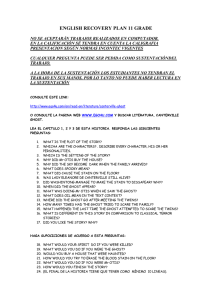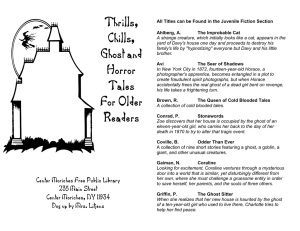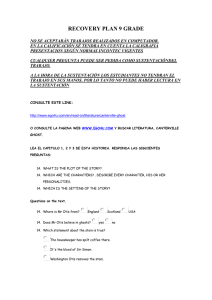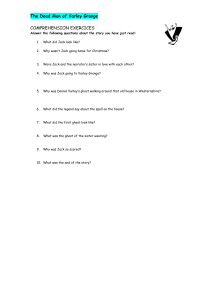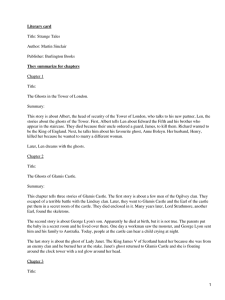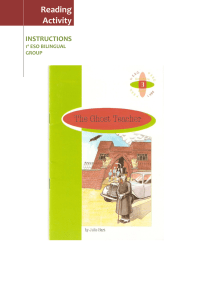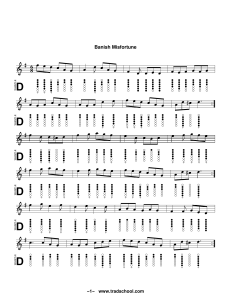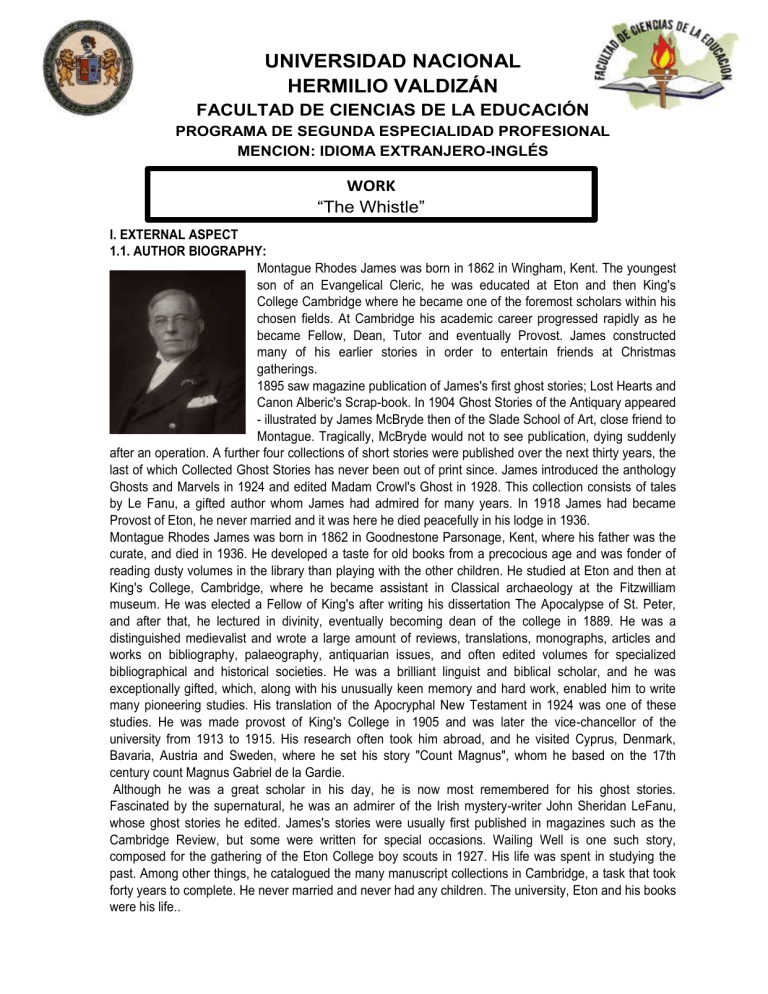
UNIVERSIDAD NACIONAL HERMILIO VALDIZÁN FACULTAD DE CIENCIAS DE LA EDUCACIÓN PROGRAMA DE SEGUNDA ESPECIALIDAD PROFESIONAL MENCION: IDIOMA EXTRANJERO-INGLÉS WORK “The Whistle” I. EXTERNAL ASPECT 1.1. AUTHOR BIOGRAPHY: Montague Rhodes James was born in 1862 in Wingham, Kent. The youngest son of an Evangelical Cleric, he was educated at Eton and then King's College Cambridge where he became one of the foremost scholars within his chosen fields. At Cambridge his academic career progressed rapidly as he became Fellow, Dean, Tutor and eventually Provost. James constructed many of his earlier stories in order to entertain friends at Christmas gatherings. 1895 saw magazine publication of James's first ghost stories; Lost Hearts and Canon Alberic's Scrap-book. In 1904 Ghost Stories of the Antiquary appeared - illustrated by James McBryde then of the Slade School of Art, close friend to Montague. Tragically, McBryde would not to see publication, dying suddenly after an operation. A further four collections of short stories were published over the next thirty years, the last of which Collected Ghost Stories has never been out of print since. James introduced the anthology Ghosts and Marvels in 1924 and edited Madam Crowl's Ghost in 1928. This collection consists of tales by Le Fanu, a gifted author whom James had admired for many years. In 1918 James had became Provost of Eton, he never married and it was here he died peacefully in his lodge in 1936. Montague Rhodes James was born in 1862 in Goodnestone Parsonage, Kent, where his father was the curate, and died in 1936. He developed a taste for old books from a precocious age and was fonder of reading dusty volumes in the library than playing with the other children. He studied at Eton and then at King's College, Cambridge, where he became assistant in Classical archaeology at the Fitzwilliam museum. He was elected a Fellow of King's after writing his dissertation The Apocalypse of St. Peter, and after that, he lectured in divinity, eventually becoming dean of the college in 1889. He was a distinguished medievalist and wrote a large amount of reviews, translations, monographs, articles and works on bibliography, palaeography, antiquarian issues, and often edited volumes for specialized bibliographical and historical societies. He was a brilliant linguist and biblical scholar, and he was exceptionally gifted, which, along with his unusually keen memory and hard work, enabled him to write many pioneering studies. His translation of the Apocryphal New Testament in 1924 was one of these studies. He was made provost of King's College in 1905 and was later the vice-chancellor of the university from 1913 to 1915. His research often took him abroad, and he visited Cyprus, Denmark, Bavaria, Austria and Sweden, where he set his story "Count Magnus", whom he based on the 17th century count Magnus Gabriel de la Gardie. Although he was a great scholar in his day, he is now most remembered for his ghost stories. Fascinated by the supernatural, he was an admirer of the Irish mystery-writer John Sheridan LeFanu, whose ghost stories he edited. James's stories were usually first published in magazines such as the Cambridge Review, but some were written for special occasions. Wailing Well is one such story, composed for the gathering of the Eton College boy scouts in 1927. His life was spent in studying the past. Among other things, he catalogued the many manuscript collections in Cambridge, a task that took forty years to complete. He never married and never had any children. The university, Eton and his books were his life.. WORKS: LITERARY WORKS/ SUMMARY YEAR OF PUBLICATION Thirteen ghost stories The thirteen ghost stories we find thirteen stories in which the (1973) phantasmagoric occupies the center of attention. Ghost stories (1988) James's ghosts are perfectly contemporary to the bourgeois reader of his time, and to induce this sense of everyday life he uses a fine British humor as well as colloquial expressions in the dialogues. Supernatural stories (1991) When reviewing some ancient and mysterious manuscript it may happen that, part of its content, a reflection of the terror and despair of its author, begins to recreate. Lost hearts (1997) A book of stories where horror, drama and humor merge and give an exquisite concoction of good and entertaining narrative. The treasure of Abbot Mr. Somerton, an antique collector translating an old book, discovers that Thomas (2000) former abbot Thomas of Steinfield Abbey allegedly hid a treasure in the religious grounds. The hex of the runes Tells the story of Edward Dunning, a researcher at the British Museum who (2000) makes an unfavorable review of the last forbidden book by a known occultist, called Karswell. Count Magus (2000) The narrator tells us that he has found the diary of an English traveler named Mister Wraxall disappeared in strange circumstances. In the text, the unfortunate character tells a trip he made to Sweden during which he learned the story of Count Magnus Gabriel de la Gardie, a seventeenthcentury nobleman who really existed and was accused of having supernatural powers by his enemies. Ghost stories of an This genre and that brings together eight fundamental stories to explain the antiquarian (2002) way of understanding fear in the literature that this author created perhaps without wanting but whose influence was fundamental in later decades. An unconscious ghost It contains the following stories: "Whitminster's residence," Mr. Poynter's (2005) diary, "An episode in the history of a cathedral," History of a disappearance and an appearance, and "Two doctors. For this volume we have added two stories that did not appear in their original compilations: «There was a man who lived next to a cemetery and« Rats. 1.2. TITLE OF THE WORK: The Whistle 1.3. GENRE: Narrative II. INTERNAL ASPECT 2.1. STRUCTURE This story has 28 pages that are not separated for sub-chapters. The introduction extends throughout from the beginning of the story even than the professor Parkins’ gets to Burnstow. START "My friends have done that this course make golf fond ( you would bet that you know it ), and I want the Eastern coast, concretely to Burnstow, to pass a week or ten days perfecionado my game - you said - I hope to go away tomorrow ". The knot give of than the professor arrive Burnstow, the moment in that you know the Colonel, when you come across the whistle, when you realize that a figure follows it but this does not advance, when you whistle with him and KNOT the gust of wind, when the colonel explains legends to him ... arrives "Even that this wind had risen up suddenly, he did not decrease all of a UNLACE sudden: You kept on blowing, moaning, coming against the building; From time to time you stopped hearing so pitiful wailing, as Parkins’ with his usual objectivity, said than very well can fill of fears to the too imaginative people, and still the ones that were lacking for I complete of imagination, you considered a quarter-hour after, they would have felt further at ease without him ". The outcome begins when the professor Parkins’ becomes aware of somebody else you are in his room until you finish the story. "And there is nothing more than adding, in reality; But, as they can imagine, the opinions of the professor on determined issues are not right now everything sign it that they used to be. His nerves, also they are shattered: Still you tremble when seeing a surplice hanging from the door, and the vision of a scarecrow at the field, some evenings to endings of winter, it has cost over a night to him of insomnia ". 2.2. ADAPTATIONS: THE WHISTLE ADAPTATIONS TELEVISION 2.3. CHARACTERS: PRINCIPAL Parkins’: The professor came from Ontografía. Colonel Wilson: A military ancien. SECONDARY The professor Rogers The strange creature The maid of the hotel . 2.4. SUMMARY: Professor Parkins’ visits an ocean-side inn during his semester break to focus on a bit of research and a bit of golfing. Before going, one of his colleagues asks him to check out a particular area near where he is staying to determine if it is suited for an archaelogical dig. Parkins’ agrees and heads off to his break. We are told by the narrator that Parkins’ is someone who scoffs at the idea of the supernatural and refuses to buy into such superstition. He goes to the inn and begins his vacation. He makes friends with another resident at the inn, a colonel and the two play golf. While out at near dusk, Parkins’ visits the site and explores. He finds a strange whistle and he walks back to the inn. On his way back, he turns around to see a man (he believes) to be moving about in his direction but at an inconceivable pace. He returns to the room and blows the whistle which has a strange sound to it. It also have writing on it which he believes is Latin. Following second time he blows the whistle is a fierce wind that rattles the inn. Afterward when he settles into bed, he closes his eyes but every time, he has a vision of some man running towards him on the beach. It continues to frighten him until morning. The next day, he reconvenes with the Colonel and the two have another go at golf. On their way home, a young boy runs into them filled with fear. The boy explains he saw some figure climbing out of the inn's upper window. When they get to the inn, the window is identified as Parkins’ so he goes up to his room to investigate. It's clear that someone has messed with his bed but nothing else is clear. Eventually, he settles down fro bed and dozes off. At some later hour, he awakes and watches the bed sheets on the other bed (there were 2 beds in his room rise up in the form of a body and move towards him. The two struggle and at some point, Parkins’ sees the being close up. As the two are pitched near the window, the Colonel busts into the room and saves Parkins’ from falling to his death. In the aftermath, it's clear that Parkins’ now believes in the supernatural. This story tells of a man named Professor Parkins’, had gone to town to play golf Burston and investigate the old church. He stayed in a hotel called the globe. When he arrived he was shown his room and saw a window, outside, saw the sea and the beach. Then in the afternoon, Professor Parkins went to play golf with his friend named Colonel Wilson, he had been an officer of the army of India, and Parkins’ was archaeologist. After talking, Parkins’ went to the abandoned church and among the rocks saw a hole inside the hole found something metal, but did not know it was because it was night. Then he went to the inn but before he began to relax, and suddenly saw a shadow behind him, the shadow was on the beach and he did not know if he was a man or a woman, then ran to the inn and saw the Colonel and when he looked back the shadow had disappeared. Then the Colonel and Parkins had dinner. Then Parkins’ went to his bedroom and pulled the metal and was a whistle. He is clean and hear the whistle and also horrible noises of wind, Parkins’ decided to lie down because he was afraid. But woke up because he had dreamed the same shadow as before. In the morning the Colonel and Parkins’ had breakfast and went to play golf. When they were playing Parkins’ told what happened last night and the colonel told him that if he needed to call him. In the evening Professor Parkins’ was in his room and saw that the window had no curtains, sheets then put in the window, then the other side of the room the professor Parkins’ saw that the sheets had risen, and began to approach him, Professor Parkins’ opened the windows and said I need help, but the ghost had caught the professor Parkins, and suddenly the Colonel appeared and helped him, but the ghost had vanished when the Colonel had arrived. The next day at the beach Colonel told the professor Parkins’ the ghost that can cause harm but if you scared. 2.5. CENTRAL THEME: The fear of the fnatasmas and the superstitions III. INTERPRETATIVE ASPECT 3.1. MESSAGE: The person that in the beginning you were not wanting that you accompany you to no place, at the end you can save your life. 3.2. CRITICAL ASSESMENT: The time could be at the end of the s. XIX or early XX, even if he does not quote it, we can assume it. The action takes place for a little less than a week. The title seems totally adequate and makes sense with the rest of the work. The fragment we liked the most has been the moment in which it is narrated as Mr. Parkins’ is attacked. 3.3. OPINION: The title seems totally adequate to us and has sense with the rest of the work. What else we have liked the fragment it has been the moment one tells in like Mr. Parkins’ you are attacked. But then you understood that it was the worst thing that you could have come up with him, why the character of the empty bed with a soft and sudden movement, you sat up and you assumed a defensive attitude, with the arms extended between the two beds, in front of the door. IV. LINGUIST ASPECT 4.1. VOCABULARY Ghost. Unreal, imaginary or fantastic and usually incorporeal figure that someone thinks they see. Undivided. That is not divided into parts. Fussy. [Person] Easily offended by insignificant things that he gives more value or importance than they deserve. Furtive. What is done secretly or in a sneaky way. Receptacle. Cavity in which a substance is contained or may contain. 1. a) b) c) 2. 3. 4. 5. 6. 7. 8. 9. 10. 11. 12. a) b) c) 13. QUESTIONS Parkins’ stayed at the Globe Inn in Burnstow. How many rooms were there in the inn? In the inn there were two rooms. How many beds were there in Parkins' room? In Parkins ’room there were two beds. What was unusual about the window? The room had no curtains on the windows. Where had colonel Wilson lived for many years? he lived for many years in India, because he had been the army officer. What is an archeologist? Archeologist study the history of the human being trhough the remains such as bones, tissues, ceramics, tools, landscape ad construction characteristics. It's functions include the excavation, identification, registration and conservation of historical remains. His work also involves laboratory analysis, research, wealth management and planning advice. Why did Parkins’ not walk back to the inn with the colonel? Because he began to walk along the beach, moving the stones in his path, where he found a hole and within it there was an old object, he was there until very late. What did Parkins’ find in the hole? An old the whistle was found. Why did professor Parkins’ suddenly feel afraid? Because he saw a black figure on the beach, He didn’t know if he was male or female, he trought was following him. What was written on the whistle? In the whistle there was a script in latin that said: “Quist est iste qui venit” Which translated is: who is this coming? What happened when the professor blew the whistle? There was a sad sound, the candle went out and a strong wind blew into the room. What did Parkins’ see in his dream? He saw that something black run from the beach. In the morning, the servant come to clean Parkins’ room. What was stroge about the beds? This one was very messy. What did the boy see in the window of Parkins’ room? The boy saw something horrible, a ghost and it scared him. What did the Colonel tell Parkins to do with the whistle? Told him to throw it into the sea ´A noise came from the empty bed´ What did Parkins’ see on the bed? Saw a ghost or demon What did the face under the sheet look like? It looked very scary Who came in ti the room? Professor Parkins’ came in to see the strange being. Why is the Professor afraid of curtains that move in the wind? The teacher fears the curtains because from there the ghost appeared. 1. 2. 3. 4. 5. 6. 7. 8. 9. 10. 11. 12. 13. QUESTIONS Parkins’ stayed at the Globe Inn in Burnstow. a) How many rooms were there in the inn? In the inn there were two rooms. b) How many beds were there in Parkins' room? In Parkins ’room there were two beds. c) What was unusual about the window? The room had no curtains on the windows. Where had colonel Wilson lived for many years? he lived for many years in India, because he had been the army officer. What is an archeologist? Archeologist study the history of the human being trhough the remains such as bones, tissues, ceramics, tools, landscape ad construction characteristics. It's functions include the excavation, identification, registration and conservation of historical remains. His work also involves laboratory analysis, research, wealth management and planning advice. Why did Parkins’ not walk back to the inn with the colonel? Because he began to walk along the beach, moving the stones in his path, where he found a hole and within it there was an old object, he was there until very late. What did Parkins’ find in the hole? An old the whistle was found. Why did professor Parkins’ suddenly feel afraid? Because he saw a black figure on the beach, He didn’t know if he was male or female, he trought was following him. What was written on the whistle? In the whistle there was a script in latin that said: “Quist est iste qui venit” Which translated is: who is this coming? What happened when the professor blew the whistle? There was a sad sound, the candle went out and a strong wind blew into the room. What did Parkins’ see in his dream? He saw that something black run from the beach. In the morning, the servant come to clean Parkins’ room. What was stroge about the beds? This one was very messy. What did the boy see in the window of Parkins’ room? The boy saw something horrible, a ghost and it scared him. What did the Colonel tell Parkins to do with the whistle? Told him to throw it into the sea ´A noise came from the empty bed´ a) What did Parkins’ see on the bed? Saw a ghost or demon b) What did the face under the sheet look like? It looked very scary c) Who came in ti the room? Professor Parkins’ came in to see the strange being. Why is the Professor afraid of curtains that move in the wind? The teacher fears the curtains because from there the ghost appeared.
